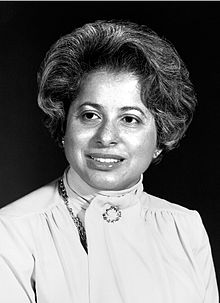Patricia Roberts Harris | |
|---|---|
 | |
| 13th United States Secretary of Health and Human Services[a] | |
| In office August 3, 1979 – January 20, 1981 | |
| President | Jimmy Carter |
| Preceded by | Joseph A. Califano Jr. (Health, Education, and Welfare) |
| Succeeded by | Richard Schweiker (Health and Human Services) Shirley Hufstedler (Education) |
| 6th United States Secretary of Housing and Urban Development | |
| In office January 23, 1977 – September 10, 1979 | |
| President | Jimmy Carter |
| Preceded by | Carla Anderson Hills |
| Succeeded by | Moon Landrieu |
| United States Ambassador to Luxembourg | |
| In office September 7, 1965 – September 22, 1967 | |
| President | Lyndon B. Johnson |
| Preceded by | William R. Rivkin |
| Succeeded by | George J. Feldman |
| Personal details | |
| Born | Patricia Roberts May 31, 1924 Mattoon, Illinois, U.S. |
| Died | March 23, 1985 (aged 60) Washington, D.C., U.S. |
| Resting place | Rock Creek Cemetery Washington, D.C., U.S. |
| Political party | Democratic |
| Spouse |
William Harris
(m. 1955; died 1984) |
| Education | Howard University (BA) University of Chicago American University (MS) George Washington University (JD) |
Patricia Roberts Harris (May 31, 1924 – March 23, 1985) was an American politician, diplomat, and legal scholar. She served as the 6th United States secretary of housing and urban development from 1977 to 1979 and as the 13th United States secretary of health and human services[a] from 1979 to 1981 under President Jimmy Carter. She previously served as the United States ambassador to Luxembourg from 1965 to 1967 under President Lyndon B. Johnson. Throughout her public career, Harris was a trailblazer for women and people of color to hold a number of positions, including the first African American woman and woman of color ever to serve in a presidential cabinet and the first woman and person of color appointed to two different presidential cabinet positions. She was the first African American HHS secretary and just the second black HUD secretary, as well as the second woman to lead either of those executive departments. Furthermore, she was the first black woman U.S. ambassador, the dean of a U.S. law school, and a member of a Fortune 500 company's board of directors. A member of the Democratic Party, she ran for mayor of the District of Columbia in the 1982 mayoral election but was defeated during the primaries, ultimately finishing second to incumbent mayor Marion Barry.[1][2][3][4][5][6]
Cite error: There are <ref group=lower-alpha> tags or {{efn}} templates on this page, but the references will not show without a {{reflist|group=lower-alpha}} template or {{notelist}} template (see the help page).
- ^ "A Higher Standard: Patricia Roberts Harris". National Museum of African American History and Culture. November 8, 2010. Retrieved February 19, 2021.
- ^ "Patricia Roberts Harris | American public official". Encyclopedia Britannica. Retrieved February 19, 2021.
- ^ DeLaat, Jacqueline (2000). "Harris, Patricia Roberts". Women in World History, Vol. 7: Harr-I. Waterford, CT: Yorkin Publications. pp. 14–17. ISBN 0-7876-4066-2.
- ^ US State Department. "Patricia Roberts Harris: Ambassador - National Museum of American Diplomacy". Archived from the original on July 2, 2022. Retrieved February 19, 2021.
- ^ "Harris, Patricia Roberts". National Women's Hall of Fame. Retrieved February 19, 2021.
- ^ Weatherford, Doris. Women in American Politics: History and Milestones. United States, SAGE Publications, 2012. p. 314-315